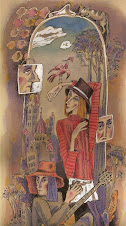How to beat painter's block
Dear Sherrie,
A lot of stuff has been written about writer's block, mainly because writers write. At the same time, there's been a surprising lack of guidance in the parallel condition of painter's block, mainly because painters paint. While many fight it daily and some never experience it at all, I always thought I might try to do something about the shortfall. Here are a few thoughts:
The sheer size and daunting length of a novel do not equate to a small easel painting that may take only a short time. Painters, identifying bite-sized projects suited to their current spans of concentration, can go from one work to another, randomly or in rapid sequence. Short-duration projects are block beaters. Painters can take wisdom from prolific haiku masters. Reducing individual project size compounds satisfaction and helps stickhandle the way. Rather than three medium-sized paintings a month, think of 30 small ones. Smaller works are more readily chuckable.
Another block beater is the "Working Without Plan" system. Blocks often occur in the planning stage and ideas get aborted before the brush hits the canvas. Just as writers learn to start writing before they know what they're writing, painters need to squeeze out and simply begin.
Further, blocks occur through the commonplace error of letting the cat out of the bag. Verbalization eviscerates desire. Talking blocks action. It's been my persistent observation that mute artists are more consistently productive than verbal ones.
Then there's the tyranny of the jaded brain. "Been there, done that, got the t-shirt" haunts both the mature and the overeducated. This form of ennui requires a reinvestment in innocence, a return to the childlike view and a simple commitment to play. Not easy for some, but doable. Just as the block itself can be a self-delusory avoidance activity, the release to play is just another self-delusion needed for creative growth.
Painter's block is a kind of creative blindness. Fortunately a temporary disability, it obscures the limitless depth of human invention. The reasons for the blindness vary from artist to artist, but all forms can be neutralized, if not beaten, by rest, change, action, going smaller, going kiddie, and being quiet.
Best regards,
Robert
PS: "The block is an entirely imaginary, self-inflating disease afflicting both nothing-to-say professionals and not-knowing-how-to-say-it amateurs." (Ray Robertson, novelist)
Esoterica: Page Fright--Tools, Tricks and Fetishes of Famous Writers, by Harry Bruce, is the latest book to probe these mysteries. He thinks creative folks need to make a leap of faith and begin to feel that nothing but the successful execution of their chosen art can deliver true happiness. Seeing our art as "important" can both stymie and empower us. If day-to-day happiness is important to you, the theory goes, not conquering these stupid blocks invites a perennial state of misery.
I Left MAGA Host SPEECHLESS on CNN
1 month ago










No comments:
Post a Comment